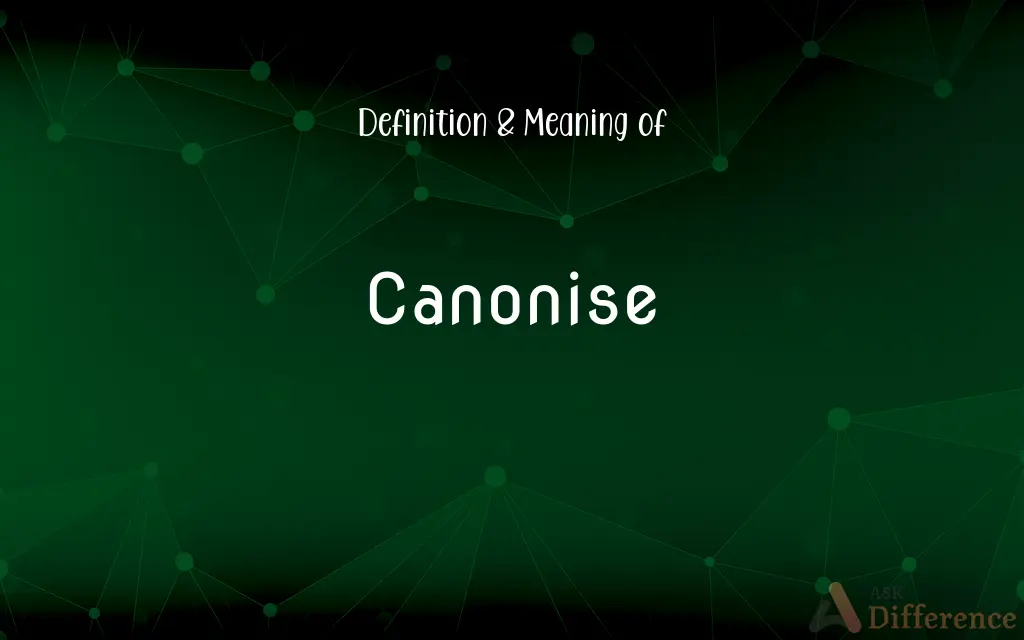Canonise Definition and Meaning
By Urooj Arif & Fiza Rafique — Updated on March 5, 2024
To canonise (British spelling) means to officially declare someone a saint in the Christian Church or to recognize something as being of enduring value and authority. e.g., The Church decided to canonise the martyr for his unwavering faith.

Table of Contents
Canonise Definitions
Religious Declaration: Officially declaring a deceased person a saint by the Church.
After many miracles were attributed to her, the Church moved to canonise her.
Literary Acceptance: Recognizing a work as part of the literary canon.
Shakespeare's works were quickly canonised in English literature.
Cultural Endorsement: Accepting an element as essential within a cultural tradition.
The festival was canonised as a vital part of the town's heritage.
Artistic Recognition: Acknowledging an artist's work as classic or of high value.
Van Gogh's paintings were canonised posthumously.
Musical Canonisation: Establishing a piece of music as standard or classic.
Beethoven's symphonies were canonised in the realm of classical music.
Historical Canonisation: Deeming events or figures as pivotal in history courses.
The moon landing is canonised in modern history.
Philosophical Acknowledgment: Recognizing a theory or work as foundational in philosophy.
Plato's Republic was canonised in Western philosophy.
Social Canonisation: Elevating social norms or behaviors to accepted standards.
The concept of democracy has been canonised in many societies.
Educational Standardization: Including content as essential in educational curricula.
Newton's laws of motion have been canonised in physics education.
Alternative spelling of canonize
Treat as a sacred person;
He canonizes women
In the Catholic church; declare (a dead person) to be a saint;
After he was shown to have performed a miracle, the priest was canonized
Add in the canon or calendar of the saints;
He was canonized not long after his death
Scientific Recognition: Accepting a discovery as fundamental in the scientific community.
Darwin's theory of evolution was eventually canonised by scientists.
Canonise Snonyms
Glorify
To praise or honor something or someone to a very high degree.
The documentary aimed to glorify the achievements of the pioneers.
Enshrine
To preserve (a right, tradition, or idea) in a form that ensures it will be protected and respected.
The constitution enshrines the rights of the citizens.
Venerate
To regard with great respect; revere.
Many venerate their ancestors through rituals and ceremonies.
Elevate
To raise to a more important or impressive level.
The actor was elevated to stardom after his latest movie.
Bless
To confer or invoke divine favor upon; ask God to look favorably on.
The priest blessed the congregation at the end of the service.
Hallow
To honor as holy; consider sacred; venerate.
The ground where the battle took place is now hallowed.
Sanctify
To set apart as or declare holy; consecrate.
The church will sanctify the new altar next Sunday.
Beatify
To declare (a deceased person) to be among the blessed and thus entitled to specific religious honor.
She was beatified by the Pope for her miraculous deeds.
Worship
To show reverence and adoration for (a deity); honor with religious rites.
They worship in a small, hilltop chapel.
Exalt
To hold (someone or something) in very high regard; think or speak very highly of.
The poet was exalted as a genius of his generation.
Canonise Idioms & Phrases
Canonise in public opinion
To become widely respected or revered by the general populace.
Through his philanthropic efforts, he was canonised in public opinion.
Canonise the principles
To hold certain principles in the highest regard or as undeniably true.
The movement sought to canonise the principles of equality and justice.
Canonise by acclaim
To be recognized as outstanding or superior by widespread consensus.
The novelist was canonised by acclaim after the publication of her groundbreaking work.
Canonise in history
To be remembered and honored throughout history for one's contributions.
The founding fathers were canonised in history for their role in establishing the nation.
Canonise with words
To praise or glorify someone so extensively that they are elevated to the highest status in people's minds.
The leader was canonised with words at the memorial service.
Canonise in memory
To be held in the highest personal regard by someone, often after death.
Her grandmother was canonised in her memory, always remembered with fondness and respect.
Canonise in the hearts
To earn a permanent place of love and respect in people's hearts.
The benevolent queen was canonised in the hearts of her subjects.
Canonise through art
To immortalize someone or something by depicting them in art.
The painter sought to canonise the heroism of everyday people through his portraits.
Canonise in literature
To ensure a person or concept is permanently honored and remembered in literary works.
The poet canonised the beauty of the natural world in her verses.
Self-canonise
To act in a manner that assumes or demands recognition and honor from others.
In his arrogance, he attempted to self-canonise, expecting others to treat him as a venerable figure.
Canonise in the collective memory
To be remembered and honored by society as a whole.
The peace advocate was canonised in the collective memory for his role in ending the conflict.
Canonise through achievement
To be elevated in status or respect due to one's accomplishments.
The scientist was canonised through achievement after discovering the cure.
Canonise at the altar of fame
To be celebrated or venerated as a result of one's fame or celebrity status.
Celebrities are often canonised at the altar of fame, regardless of their personal virtues.
Canonise on social media
To receive widespread admiration and recognition on social media platforms.
The activist was canonised on social media for her tireless advocacy work.
Canonise through accolades
To be given honors or awards that solidify one's status as distinguished or revered.
Over her career, the actress was canonised through accolades, winning numerous awards.
Canonise in the annals of history
To ensure someone's name and deeds are recorded and remembered throughout history.
Warriors who fought for freedom are canonised in the annals of history.
Canonise by the masses
To be declared or treated as highly respected or revered by the general population.
The humanitarian's work led him to be canonised by the masses.
Canonise as a legend
To become so celebrated that one is regarded as a legend.
The athlete's record-breaking career ensured he was canonised as a legend.
Canonise in lore
To become a subject of folklore or legendary tales.
The explorer was canonised in lore, with tales of his adventures told for generations.
Canonise through tradition
To become an integral and revered part of cultural or family traditions.
The festival was canonised through tradition, becoming a sacred event for the community.
Canonise Example Sentences
Scholars often debate which authors should be canonised in the literary canon.
The community's tradition was canonised through its inclusion in national celebrations.
Many hope that the church will soon canonise her for her charity work.
To be canonised as a saint, a miracle must be attributed to the individual.
His theory was finally canonised in the academic community.
The festival's music has been canonised, played yearly without fail.
The pope will canonise two new saints this year.
The artist's early works were canonised in the museum exhibit.
They seek to canonise the hero's deeds in the history books.
Canonising laws within a society ensures their longevity and respect.
Her writings on equality have been canonised in the study of social justice.
That ancient philosopher was canonised for his contributions to ethics.
The practice of meditation has been canonised in various cultures for its benefits.
The director's films were canonised for their innovative storytelling techniques.
He was canonised by his followers, who saw him as a visionary leader.
Common Curiosities
How is canonise used in a sentence?
Mother Teresa was canonised by the Pope in 2016.
How do we divide canonise into syllables?
Canonise is divided into syllables as follows: ca-non-ise.
How many syllables are in canonise?
There are three syllables in canonise.
Why is it called canonise?
It is called canonise because it refers to the act of officially declaring someone a saint in the Christian Church.
What is the pronunciation of canonise?
Canonise is pronounced as /ˈkænənaɪz/.
What is the root word of canonise?
The root word is "canon," which refers to a rule or a standard.
What part of speech is canonise?
Canonise is a verb.
What is the singular form of canonise?
The singular form is "canonise."
What is a stressed syllable in canonise?
The stressed syllable in canonise is the second syllable: "non."
What is the third form of canonise?
The third form (past participle) is "canonised."
What is the plural form of canonise?
Canonise does not have a plural form as it is a verb.
What is the first form of canonise?
The first form (base form) is "canonise."
What is the second form of canonise?
The second form (past simple) is "canonised."
Is canonise a negative or positive word?
Canonise is generally considered a positive word as it is associated with sainthood.
Is the canonise term a metaphor?
Canonise is not typically used as a metaphor; it is used in a specific religious context.
Is the word canonise Gerund?
The gerund form of canonise would be "canonising."
What is the verb form of canonise?
The verb form is "canonise."
What is another term for canonise?
Another term for canonise is "saint."
Which vowel is used before canonise?
There is no specific rule for using a vowel before canonise. It depends on the context of the sentence.
Is canonise an abstract noun?
No, canonise is not a noun; it is a verb.
Is canonise a countable noun?
Canonise is not a noun; it is a verb.
Which conjunction is used with canonise?
Conjunctions such as "and" or "or" can be used with canonise, depending on the context.
Is canonise a noun or adjective?
Canonise is a verb.
Is canonise an adverb?
No, canonise is not an adverb.
Is canonise a vowel or consonant?
The first letter of canonise, "c," is a consonant.
Is the word canonise imperative?
Yes, canonise can be used in the imperative form (e.g., "Canonise this person as a saint").
Which determiner is used with canonise?
Determiners such as "to" or "will" can be used with canonise when forming infinitives or future tense (e.g., "to canonise," "will canonise").
Which article is used with canonise?
Articles such as "to" or "the" can be used with canonise when forming infinitives or in specific contexts (e.g., "to canonise," "the canonised saint").
What is the opposite of canonise?
The opposite of canonise is "excommunicate" or "decanonise."
Is canonise a collective noun?
No, canonise is not a collective noun.
Is the word “canonise” a Direct object or an Indirect object?
Canonise can take a direct object (e.g., "The church canonised the martyr").
Which preposition is used with canonise?
Prepositions such as "as" or "into" can be used with canonise (e.g., "canonise as a saint," "canonise into sainthood").
Share Your Discovery

Previous Term
Do the Dishes Definition and Meaning
Next Term
Collaborate Definition and MeaningAuthor Spotlight
Written by
Urooj ArifUrooj is a skilled content writer at Ask Difference, known for her exceptional ability to simplify complex topics into engaging and informative content. With a passion for research and a flair for clear, concise writing, she consistently delivers articles that resonate with our diverse audience.
Co-written by
Fiza RafiqueFiza Rafique is a skilled content writer at AskDifference.com, where she meticulously refines and enhances written pieces. Drawing from her vast editorial expertise, Fiza ensures clarity, accuracy, and precision in every article. Passionate about language, she continually seeks to elevate the quality of content for readers worldwide.



































